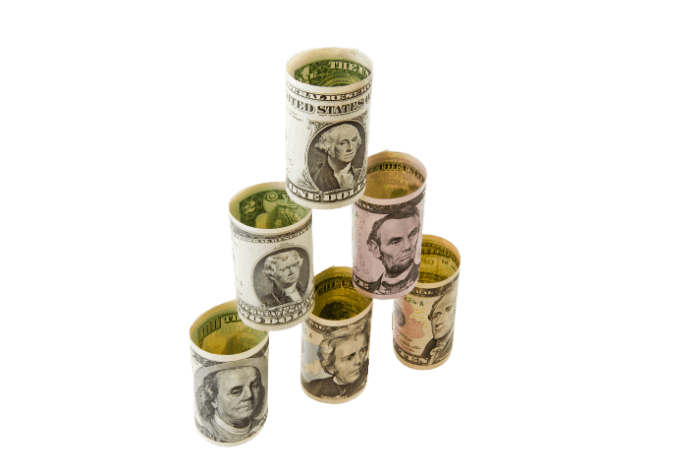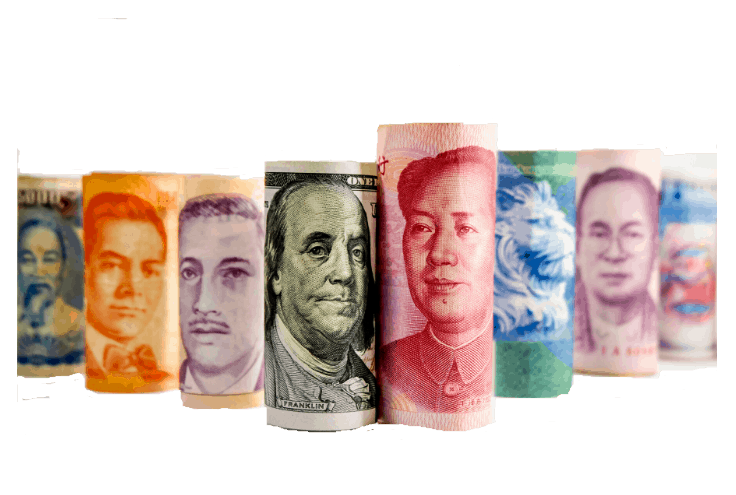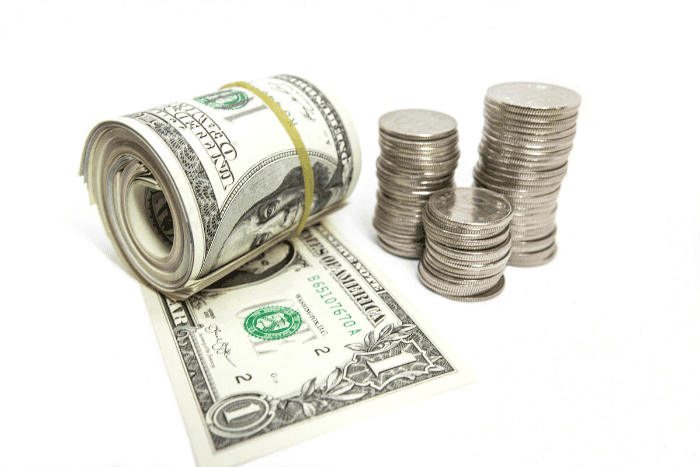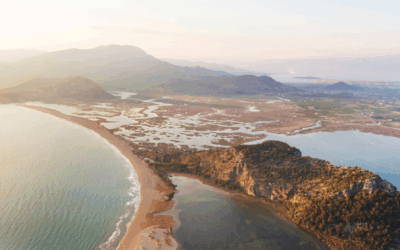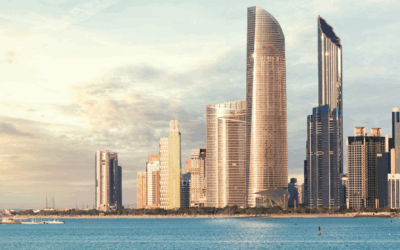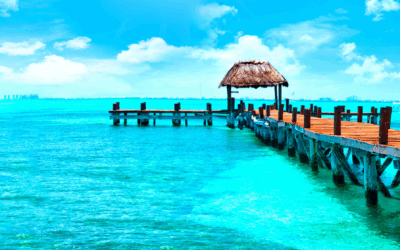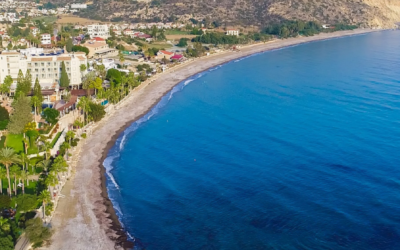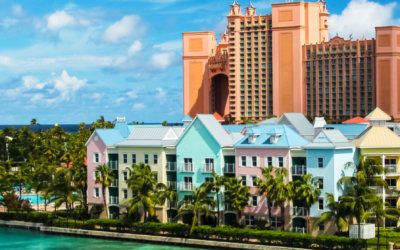So, now you have less money to reinvest in your business to accelerate growth, less to put into other investments and less to live the lifestyle you want.
If that rings true for you, it could be time to try something different.
You’re not alone – many people have felt trapped beneath a hefty tax bill when starting their first business. And while so many business owners throw up their hands and accept a lifetime of business-crushing tax bills, you can take action and do something different.
Nomad Capitalist’s founder, Andrew Henderson, incorporated his company offshore and, by doing so, legally lowered his tax rate from 43% to single-digit numbers. Now, he lives the Nomad Capitalist lifestyle, with bases around the world that allow him to travel and help others gain the same advantage. As the founder of Nomad Capitalist, he’s built a worldwide team of more than 80 professionals who design holistic, personalised blueprints for successful entrepreneurs and investors who know the value of using tools like offshore companies.
If he can do it, so can you. Will you be our next success story?
REASONS TO OPEN AN OFFSHORE BANK ACCOUNT
DIVERSIFICATION
Putting money into offshore accounts in various countries is an excellent way to diversify.
ASSET PROTECTION
Offshore bank accounts take your wealth out of the reach of broke governments, aggressive lawyers and creditors.
HIGH INTEREST RATES
Offshore banking is a great way to obtain higher interest rates with multi-currency accounts and more.
Why you should open an offshore bank account
The place to start your offshore journey is to strongly consider obtaining a second citizenship. Below, we explain the benefits of obtaining multiple passports and walk you through the methods to obtaining another citizenship.
Getting that second passport is becoming harder and harder and the window of opportunity might be closing soon, so we urge you to do it sooner rather than later.
LET US CREATE YOUR HOLISTIC OFFSHORE PLAN
1. OFFSHORE BANKING OFFERS POLITICAL RISK DIVERSIFICATION
Most know about asset diversification but are unaware of the benefits of geographic diversification. There are many examples of wealthy business owners going completely bankrupt when economies and domestic banks fail, when geopolitical issues rock the boat or when fiscal policy changes.
For example, many people who held and invested all of their money in the United States lost everything during the last economic crash. Even though they had diversified their assets by owning stocks, bonds, real estate and others, very few considered the merits of geographic diversification.
And that’s why, when a crisis hits, they can lose everything. When you hold assets offshore, the downside is far less extreme.
History tends to repeat itself, and politics can make protecting your assets and wealth nerve-wracking. That’s why putting money into offshore accounts in various countries can be an excellent way to diversify.
2. YOU WON’T LOSE ASSETS THAT EASILY
Is your government going broke?
The United States is the absolute champion of debt, having run up a tab of US$33.7 trillion in federal debt and a staggering US$120 trillion in unfunded liabilities.
America’s debt is nothing short of a ticking time bomb.
Governments have a history of needing more than their citizen’s tax money to pay their bills and if things deteriorate far enough, they probably won’t shy away from targeting your personal assets.
Don’t believe us? It’s happened in Cyprus, Ireland and Poland already.
For example, a little over a decade ago, the Hungarian government forced its citizens to ditch their private pension plans and rejoin the state-run pension plans or forfeit their right to future state pension payouts (despite continued contributions).
When you bank ‘at home’, any bureaucrat can freeze your accounts without any proof or criminal charge. Money held abroad is much harder, if not impossible, for them to get their hands on.
You also need to factor in aggressive lawyers, creditors, angry ex-spouses and ex-business partners who all might want a chunk of your wealth. Offshore bank accounts take your wealth out of their reach.
3. YOU CAN EARN HIGHER INTEREST RATES
Remember that measly 1.8% interest rate you’re currently getting at your home bank?
Increase that five-fold or even ten-fold. There are countries that will pay above 10% interest rates on your deposit today.
You can even find offshore banks with up to 11% APY (annual percentage yield). Their only condition is that you don’t withdraw your money for a year. Want to know where? Get in touch.
Diversifying your money into safe offshore bank accounts can be a great way to obtain higher interest
4. DIVERSIFY THROUGH CURRENCIES
The Western world is in a ‘currency war’ that’s destroying trillions of dollars of wealth held by high-net-worth individuals like you.
Of course, holding hard assets like gold and silver is a good way to diversify, but are you up for even more risk and reward? There are emerging market currency accounts that, despite a recent clawback from APY rates of up to 18%, still offer up to 14%.
Banks in financial hubs like Hong Kong, Singapore and Andorra support 12 or even 15 currencies, all in one safe offshore bank account.
If you don’t necessarily want to diversify your currencies, you can invest in US dollar accounts for a 5-6% yield and still benefit from offshore bank accounts.
5. BANK WITH MORE CONFIDENCE
While the Great Recession of 2009 may be an increasingly distant memory, its impact is hard to forget.
There were 372 bank failures in just one year. The United States, Germany, Australia, Andorra and Panama all had banks that were affected.
Who’s to say it won’t happen again? During a recession, you hope that your money is taken care of well, but the facts tell us that simply isn’t the case.
Here’s the scary truth: the Federal Deposit Insurance Corporation (FDIC) in the United States holds less than one per cent of deposits in its reserves. If every US bank failed at once, you would only see US$1 for roughly every US$300 you deposited.
You can be confident that foreign banks don’t take those kinds of risks.
So, where can you find safe and stable banks that keep much more of your total deposit sum on hand if trouble were to hit?
Here at Nomad Capitalist, we’re continuously looking for the next best country and the next best bank. We keep extensive, up-to-date records of every bank we have dealt with through our boots-on-the-ground research approach.
We will share all of that insight when you become a client.
6. TAX OPTIMIZATION BECOMES MORE ATTAINABLE
Chances are you’ve landed on this page because you’re interested in legally lowering your tax burden.
An offshore bank account can deliver the tax benefits of a holistic wealth diversification strategy. In a nutshell, opening an offshore bank account might mean that any income gained (for example, by way of accumulating interest) won’t be taxed at all or will be taxed at a low rate. We explain this in more depth on our offshore company page.
You must conduct due diligence to determine exactly which jurisdiction and which bank to work with before you start strategising for lower taxes. There are many international tax intricacies, such as reporting and annual tax filing, to keep in mind.
That’s why it pays to have a trusted advisor by your side. Nomad Capitalist has helped over 1500 high-net-worth individuals develop a turnkey solution for offshore tax planning, dual citizenship, asset protection and global diversification. Let us put our years of real-world experience to work for you. Get started today.
GET ACTIONABLE TIPS FOR REDUCING TAXES AND BUILDING FREEDOM OVERSEAS
Sign up for our Weekly Rundown packed with hand-picked insights on global citizenship, offshore tax planning, and new places to diversify. Plus, instant alerts on key global shifts.
How to open an offshore bank account
If you’re ready to take the plunge, the next step is to open an offshore account.
A small note of caution at this point: you must do your due diligence or get some help when it comes to planning all of this. Otherwise, you might risk a fine that will swallow up your entire offshore account, or worse – jail time is an actual punishment for tax evasion, intentional or not.
There are roughly five steps in opening an offshore bank account:
-
Create an offshore banking strategy and identify your goals.
-
Find a bank that will fit your offshore strategy and hit all your objectives.
-
Open an account online or in person (more on this below); make a note of what bank fees you’ll be liable to pay.
-
Deposit money into your newly created offshore account.
-
Meet all reporting requirements that might be placed on you.
It doesn’t seem too complicated, but it sure isn’t as easy as it used to be. There are a lot of countries to choose from and plenty of offshore banking laws to worry about.
Which seems like a good point to sound that note of caution again: make sure you consult a qualified specialist before you move any of your wealth abroad.
Opening an Account Online vs In-Person
While opening a foreign bank account isn’t as easy as it used to be, it’s far easier than you think.
It’s just like banking at home. Some banks will require an appointment, while others will allow you to simply walk into a branch and speak to a manager. Some banks offer personalised services, while others keep it simple. But it all achieves the same thing and the details are just that – details. Don’t dwell on them.
What you’re after is a functional bank account that helps you accumulate wealth and diversify your assets to avoid risks. Some banks will let you open an account online, while others require that you show up in person.
Here at Nomad Capitalist, we believe that travelling to open your offshore bank account in person is the preferred method.
The best offshore banks want to see you in person. They will judge you based on your appearance and mannerisms, which might seem unfair, but it’s part of their evaluation process. So don’t walk up in a t-shirt and jeans if you want to be treated properly and have a fair chance at opening up an account that’s the most beneficial to you.
Instead, get into the head of the bank manager: what are they looking for when they’re opening your account? They want to know that you’re a reliable, wealthy individual who will pay their fees. Show them that.
LET US CREATE YOUR
HOLISTIC OFFSHORE PLAN
Where to Open an Offshore Bank Account
We give high-net-worth individuals daily advice on where to open offshore bank accounts and our extensive experience has shown that it depends on an individual’s specific situation and needs.
Where you should open an offshore account depends on issues like where you hold your passport, the currency you use, your tax residency, where you hold assets and investments, your business goals and numerous other factors.
You should consider how important the ease and function of online banking are to you, whether the bank is nomad-friendly and how solid the bank’s reputation is.
Always bear in mind, a bank is only as good as the jurisdiction that it’s in. For example, you wouldn’t want to bank in Somalia even if a bank was reported as the best and safest, as the country has been in a state of civil war for decades now.
Having an offshore bank account is part of being a diversified global citizen, so choosing the best offshore bank is a crucial step and not something to be taken lightly.
Opening an Estonian bank account might work for some, while Georgia, Vanuatu or even Mongolia might be a better fit for others.
Here at Nomad Capitalist, we curate a list of 900+ international banks and update it on a weekly basis. If you want this intel, let’s talk.
Private Banks
High-net-worth individuals should also consider private banks and their accounts.
Private banks have dedicated bank personnel who actively manage your wealth on your behalf. Accounts in this type of bank can be opened only with a substantial deposit, anywhere from US$500,000 and some banks require accumulated wealth of at least US$5 million. It’s not like the banks want to see a high number of transactions for these accounts. In other words, this account is not intended to receive consulting salary or frequent withdrawals.
If you’re in two minds about private banking, consider starting with a high-street retail account and upgrading later to a premier account if satisfied. This could be a good way to introduce yourself to the world of private banking and premium bank accounts for high-net-worth people.
Challenges of Offshore Banking and Account Maintenance
As a high-net-worth individual or an ultra-high-net-worth individual, you’re probably aware that nothing in life is as easy as it might seem.
So, you’ve opened an account and put money into it. What happens next?
There are a few challenges and considerations listed below when it comes to account maintenance.
What’s FATCA Got to Do With it?
Banking offshore used to be much easier when there were no strict reporting requirements and you could coast by or even completely fall under the radar.
That’s no longer the case for most nationalities and especially not for Americans. The United States passed the FATCA (Foreign Account Tax Compliance Act) back in 2010 and offshore banking has become more restricted ever since.
FATCA is not hugely complicated, just hugely time-consuming. You will have to report each of your foreign bank accounts to the US government and they will ensure that any tax that’s due has been paid.
So, if you do find yourself in the midst of the headache of filling out FATCA forms, you might want to consider that the US is pretty much the only country in the world that taxes the worldwide income of its citizens, regardless of where they live.
Account Freezes, Closures and Banks Going Under
It’s life – anything can happen and offshore banking is not immune to political and social unrest.
There are stories of banks in Europe that have started limiting customers’ access to their own money. And what happens when a bank goes under? Not even deposit insurance can protect everyone.
To understand how to avoid financial disasters, the key is to look at the big picture – not the individual instances of freezes and closures – and be able to recognise which banks and which accounts are good options and which are worth avoiding. So research and due diligence are the keywords here.
This much is certain: the world of offshore banking will serve you loads of curve balls. It’s best to be prepared and diversified.
LET US CREATE YOUR
HOLISTIC OFFSHORE PLAN
“Offshore bank accounts are completely legal if done in a way that complies with the laws of your home country.”
Offshore Banking Myths: Debunked
We know there are a lot of misconceptions about offshore banking. We deal with it every day.
Let us dispel some of the most common myths in a quick Q&A round.
ARE OFFSHORE BANKS SAFE?
The goal of opening an offshore bank account is to do it at the safest possible bank. So yes, the offshore banks that you want to go for are safe. These banks will have minimal risk of failing and keep comparably high levels of capital on hand. However, just as all banks in your home country aren’t created equal, there are dubious offshore banks out there.
IS IT LEGAL TO HAVE AN OFFSHORE BANK ACCOUNT?
Offshore bank accounts are completely legal if opened and operated in a way that complies with the laws of your home country. That includes not forgetting, or ignoring, the annual reporting requirements for your account to stay in compliance. It is not illegal to bank offshore, but hiding your offshore accounts is.
WHAT’S THE DIFFERENCE BETWEEN TAX OPTIMIZATION AND TAX EVASION?
Tax evasion is illegal, no matter where you’re trying to do it — at home or overseas. On the other hand, tax optimisation is 100% legal if done in accordance with the laws of the jurisdiction where the bank is located and your home country. People use offshore bank accounts to decrease their tax burden in a country where income and profit aren’t taxed or are taxed at a lower percentage than back home.
ARE BANKS IN SWITZERLAND THE SAFEST?
For a long time, Swiss banks were the world standard when it came to privacy. The country had exceptionally strong privacy laws and the banks once used numbered accounts instead of names to attribute sums of money to their clients. The people who banked with these banks loved that and, while that’s not the case anymore (due to new transparency and reporting laws), the Swiss have retained their rock-solid banking reputation.
Plus, they have a very stable economy, virtually no inflation, and a currency backed by 40% gold reserves. The bank regulators in Switzerland require that banks hold on to high levels of capital for deposit protection, which means that in times of turmoil, your money will most likely make its way back to your pocket.
While there are many other high-quality jurisdictions, Switzerland’s banks remain some of the safest in the world.
DO RICH PEOPLE BANK OFFSHORE
TO HIDE MONEY FROM TAX COLLECTORS?
Because offshore banks traditionally have had such a terrible reputation, it’s easy to see why this question comes up time and time again. Historically, offshore banks could have been used to evade taxes and there were many ways to set up an account and make it invisible to tax collectors.
Nowadays, new reporting rules and heightened levels of information sharing between jurisdictions mean that it’s virtually impossible to hide money from governments.
Shou You Risk Doing It Yourself?
Offshore banking for high-net-worth individuals is not a DIY undertaking. We’re not saying that to secure you as a client but because there is simply too much at stake if you mess it up. We know from personal experience and the experience of hundreds of our clients that some things are too tricky to navigate without insider knowledge.
We know what we’re talking about – this is what our team does every day.
We have researched, met with and developed relationships with more than 900 banks around the world. We’re constantly updating our banking data with the latest information so we can make the best-informed decisions for each of our clients.
We have our ear to the ground on a daily basis to be the best advocates for our offshore banking clients. We look at which banks don’t work with forex traders, which only take on a company incorporated in a ‘top tier’ jurisdiction or which have recently increased their minimum deposit to unattainable heights?
The rules and procedures in relation to account maintenance will vary between banks and jurisdictions and, just because a bank offers you an offshore account, that doesn’t necessarily mean it’s the best account for you. Knowing what you’re looking for – whether that’s multiple currencies or high annual percentage yield (APY) accounts – is essential so you can advocate for yourself.
LET US CREATE YOUR
HOLISTIC OFFSHORE PLAN
“Banking offshore used to be much easier. There were no strict reporting requirements and you could coast by. That’s not the case for anymore.”
YOU NEED TO GET OFFSHORE BANKING RIGHT
We couldn’t count how many times clients have come to us for help only after they’ve messed something up with their offshore bank accounts.
People have been hit with substantial fines, lost their accounts and even been prosecuted in a few cases. It’s only then that they come to our team to clean up their messes.
So, why not just get it right in the first place? It would save you a lot of money and time, that’s for sure.
Could you open an offshore bank account by yourself? Maybe.
Would you know which bank would serve you best and how to get the most out of your new account? No offence, but probably not.
We’ve done the research for you and have executed offshore banking strategies for hundreds of clients. So, don’t miss out on one of the best wealth-building, asset-protection opportunities simply because you don’t know where to start.
And never settle for an ‘OK’ bank. Life is too short to leave your assets to wither in a sub-par account. It’s time to think long-term about safety and growth through offshore banking. And once you realise that you can legally bank anywhere in the world and start exploring your options, you’ll see tremendous opportunities in banking where you’re treated best.
READ MORE ABOUT OFFSHORE BANKING
The Best Countries for Investing in the Middle East 2025
The global investment landscape has changed dramatically. Gone are the days when...
Best Gulf Country for Company Formation and Business Setup
For ambitious entrepreneurs, the Gulf region offers a powerful blend of top-tier banking systems...
Top Offshore Tax Havens in the Caribbean
When people hear the term ‘tax haven’, it often conjures up images of shadowy offshore bank...
Taxes in Portugal: The Ultimate Guide
Mention 'tax' and 'Portugal' in the same breath, and for years, the conversation would inevitably...
Best Countries with Non-Dom Status for UK Residents to Explore
After more than 100 years of allowing non-domiciled residents to avoid paying tax on...
Best Corporate Tax Havens for Your Business in 2025
For entrepreneurs and business owners, corporate tax is one of the most significant costs – and...




